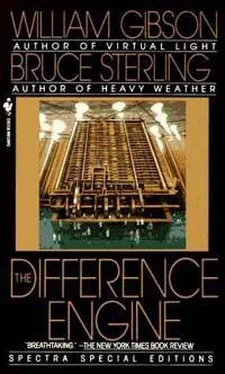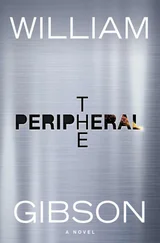William Gibson - The Difference Engine
Здесь есть возможность читать онлайн «William Gibson - The Difference Engine» весь текст электронной книги совершенно бесплатно (целиком полную версию без сокращений). В некоторых случаях можно слушать аудио, скачать через торрент в формате fb2 и присутствует краткое содержание. Жанр: sf_cyber_punk, fantasy_alt_hist, на английском языке. Описание произведения, (предисловие) а так же отзывы посетителей доступны на портале библиотеки ЛибКат.
- Название:The Difference Engine
- Автор:
- Жанр:
- Год:неизвестен
- ISBN:нет данных
- Рейтинг книги:3 / 5. Голосов: 1
-
Избранное:Добавить в избранное
- Отзывы:
-
Ваша оценка:
- 60
- 1
- 2
- 3
- 4
- 5
The Difference Engine: краткое содержание, описание и аннотация
Предлагаем к чтению аннотацию, описание, краткое содержание или предисловие (зависит от того, что написал сам автор книги «The Difference Engine»). Если вы не нашли необходимую информацию о книге — напишите в комментариях, мы постараемся отыскать её.
The Difference Engine — читать онлайн бесплатно полную книгу (весь текст) целиком
Ниже представлен текст книги, разбитый по страницам. Система сохранения места последней прочитанной страницы, позволяет с удобством читать онлайн бесплатно книгу «The Difference Engine», без необходимости каждый раз заново искать на чём Вы остановились. Поставьте закладку, и сможете в любой момент перейти на страницу, на которой закончили чтение.
Интервал:
Закладка:
Oliphant senior, having served as Attorney-General of the Cape Colony, had subsequently been appointed Chief Justice of Ceylon. Consequently, Oliphant had received a private and necessarily rather fragmentary education, one to which he owed both his fluency in modern languages and his extraordinary ignorance of Greek and Latin. His parents had been Evangelicals of a markedly eccentric sort, and though he himself retained, however privately, certain aspects of their faith, he recalled with an odd dread his father's experiments: iron wands, spheres of crystal…
And how, he wondered, climbing the carpeted stairs, would Lady Brunel be adjusting to life as the Prime Minister's wife?
His Japanese wound began to throb as he gripped the banister.
Taking out a triple-splined Maudslay key from his waistcoat-pocket, he unlocked the door to his study. Bligh, who held the key's only duplicate, had lit the gas and banked the coals.
The study, paneled in oak, overlooked the park from a shallow triple-bay. An ancient refectory-table, quite plain, running very nearly the length of the room, served as Oliphant's desk. A very modern office-chair, mounted on glass-wheeled patent casters, regularly migrated around the table as Oliphant's work took him from one stack of folders to the next, then back again. The casters, in the chair's daily peregrinations, had begun to wear away the nap of the blue Axminster.
Three Colt & Maxwell receiving-telegraphs, domed in glass, dominated the end of the table nearest the window, their tapes coiling into wire baskets arranged on the carpet. There was a spring-driven transmitter as well, and an encrypting tape-cutter of recent Whitehall issue. The various cables for these devices, in tightly woven sleeves of burgundy silk, snaked up to a floral eyebolt suspended from the central lavalier, where they then swung to a polished brass plate, bearing the insignia of the Post Office, which was set into the wainscoting.
One of the receivers began immediately to hammer away. He walked the length of the table and read the message as it emerged from the machine's mahogany base.
VERY BUSY WITH PARTICULATE FOULING BUT YES DO VISIT STOP WAKEFIELD ENDIT
Bligh entered with a tray of sliced mutton and pickle. "I've brought a bottle of ale, sir," he said, setting out linen and silverware on a section of the table kept cleared for this purpose.
"Thank you, Bligh." Oliphant raised the tape of Wakefield's message with his fingertip, then let it droop back toward its wire basket.
Bligh poured the ale, then departed with his tray and the empty ceramic bottle. Oliphant trundled the office-chair around the table and sat down to spread his mutton with Branston pickle.
He was startled from his solitary meal by the clatter of one of his three receivers. He glanced down the table and saw the tape beginning to unspool in the machine to the right. The machine to the left, on which Wakefield's invitation to lunch had arrived, was on his personal number. Right meant police business of some kind, likely Betteredge, or Fraser. Putting down knife and fork, he rose.
He watched the message emerge from its brass slot.
RE F B YOU ARE REQUIRED AT ONCE STOP FRASER ENDIT
He took his father's German hunter from his waistcoat to note the time. Tucking it away, he touched the glass that domed the centermost of the three receiving-telegraphs. There had been no message on that one since the death of the late Prime Minister.
The address to which the cab earned him was in Brigsome's Terrace, off a thoroughfare of the sort that speculative builders delighted in carving through the ancient and still largely unexplored wilderness that was East London.
The terrace itself, Oliphant decided as he alighted from his hansom, was as dismal a block of buildings as had ever been composed of brick and mortar. The builder who had speculated on these ten dreary prison-houses, he thought, had likely hung himself behind the parlor door of some adjacent tavern before the hideous things were finished.
The streets through which the cab had conveyed him had been those one seemed to traverse at times such as these—all those thoroughfares seemingly unknown to day and the ordinary pedestrian. A thin rain was falling now, and Oliphant momentarily regretted not having accepted the water-proof that Bligh had offered at the door. The two men before No. 5 wore long drooping black cape-like articles of waxed Egyptian cotton. A recent innovation from New South Wales, Oliphant knew, much praised in the Crimea and precisely the thing for concealing weapons of the sort that these two most certainly concealed.
"Special Bureau," Oliphant said, briskly climbing past the guards. Abashed by his accent and manner, they let him pass. It would be necessary to report that to Fraser.
He entered the house, finding himself in a parlor lit by a powerful carbide-lantern, atop a tripod, its merciless white glare magnified by a concave round of polished tin. The parlor was furnished with scraps salvaged from the ruins of gentility. There was a cottage-piano, and a chiffonier several sizes too large for the room. The latter struck him as pathetically gorgeous, with its tarnished gilt moldings. A threadbare patch of Brussels carpet swarmed with roses and lilies, amid a desert of colorless drugget. Knitted curtains shaded the windows overlooking Brigsome's Terrace. Beside the glass, two hanging wire baskets were festooned with plants of the cactus species, which grew in prickly and spider-like profusion.
Oliphant noted an acrid stench, more penetrating than the reek of carbide.
Betteredge emerged from the rear of the house. He wore a high-crowned derby hat that made him seem altogether American, so that he might easily have been mistaken for one of the Pinkerton operatives he shadowed daily. Likely the effect was deliberate, down to the patent boots with their elasticated side-gores. His expression, quite uncharacteristically, was one of grave anxiety. "I'll take full responsibility, sir," he stammered. Something was very wrong. "Mr. Fraser's waiting for you, sir. Nothing's been moved."
Oliphant allowed himself to be led through the doorway, and up a narrow, perilously steep flight of stairs. They emerged in a barren hallway, illuminated by a second carbide-lantern. Great spreading continents of niter marred the bare plaster walls. The burnt smell was stronger here.
Through another doorway, into yet brighter glare, and Fraser's dour face looking up from where he knelt beside a sprawled body. Fraser seemed about to speak; Oliphant silenced him with a gesture.
Here, then, was the source of the reek. Upon an old-fashioned coaching-case stood a compact modern Primus stove of the sort intended for camp, its brass fuel-canister gleaming bright as a mirror. Upon its ring rested a pannikin of black cast-iron. Whatever had been cooking in this vessel was now a charred and bitterly odorous residue.
He turned his attention to the corpse. The man had been a giant; in the small room, it was necessary to step over his outspread limbs. Oliphant bent to study the contorted features, the death-dulled eyes. He straightened, facing Fraser. "And what do you make of this?"
"He was warming tinned beans," Fraser said. "Eating them straight out of the pot there. With this." With the toe of his shoe, Fraser indicated a kitchen-spoon of chipped blue enamel. "I'd say he was alone. I'd say he managed to choke down a good third of the tin before the poison felled him."
"This poison," Oliphant said, taking his cigar-case and sterling cutter from his coat, "what do you suppose it was?" He extracted a cheroot, clipped and pierced it.
"Something potent," Fraser said, "by the look of him."
"Yes," Oliphant agreed. "Big chap."
"Sir," Betteredge said, "you'd best see this." He displayed a very long knife, sheathed in sweat-stained leather. A sort of harness dangled from the sheath. The weapon's handle was of dull horn, its hilt of brass. Betteredge drew the thing from its sheath. It was something on the order of a sailor's dirk, though single-edged, with a peculiar reverse curve at the tip.
Читать дальшеИнтервал:
Закладка:
Похожие книги на «The Difference Engine»
Представляем Вашему вниманию похожие книги на «The Difference Engine» списком для выбора. Мы отобрали схожую по названию и смыслу литературу в надежде предоставить читателям больше вариантов отыскать новые, интересные, ещё непрочитанные произведения.
Обсуждение, отзывы о книге «The Difference Engine» и просто собственные мнения читателей. Оставьте ваши комментарии, напишите, что Вы думаете о произведении, его смысле или главных героях. Укажите что конкретно понравилось, а что нет, и почему Вы так считаете.









